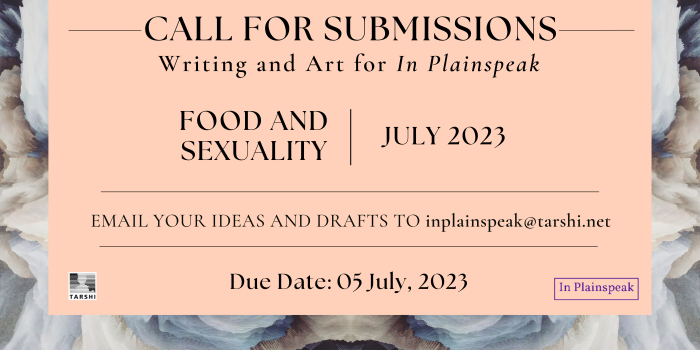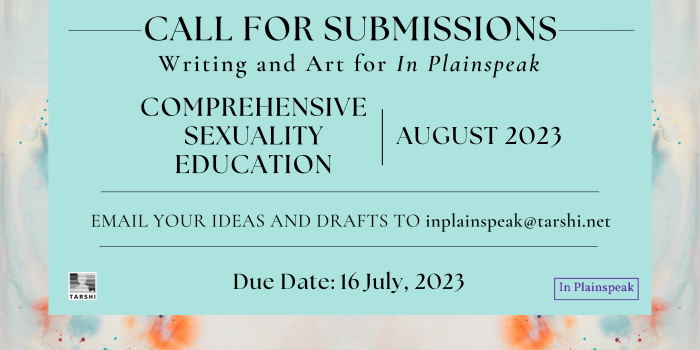
Our most powerful, sexy, responsive and attractive sexual organ may be the mind, but it is through the body that we express and experience our sexuality. Our body is our first and primary home; whether we truly feel at home in it is another matter. Some of us may have bodies that do not fit conventional ideas of beauty, some of us may have bodies that function differently from those of other people, some of us may have lost or never acquired certain bodily skills, and some of us may have bodies that don’t affirm what we believe ourselves to truly be.
Pramada Menon tells us, in a manner that is both humorous and poignant, of the tempestuous affair that she has with her body and her body’s many betrayals. It’s bad enough to have one’s body behaving in strange and unexpected ways; it only adds literal insult to injury when people feel they can freely remark upon and question one’s gender, height, weight, shape, voice, and bodily hair or its absence. Never one to give up, Pramada reveals how she responded to all of this with wit, humour and sass!
Wit, humour and sass seem to be the way to go. Tena Pick uses all three to tell us about the trials and tribulations that beset the pregnant and post-partum body. Once again, no surprise, legion are the pokers, prodders and unsolicited advice-givers! If patriarchal society would have its own way, a woman who becomes a mother can be only either asexual and holy or the object of male fetish fantasies, but Tena, being neither Madonna nor MILF, reclaims desire and pleasure and holds a middle finger up to societal expectations.
Societal expectations about how our bodies must look, behave and interact with each other are the cause of much pain and deserve many middle fingers being held up to them. We have three poems that do just this. While Mitti expounds on the many pains housed in her body, hers is a poem of proud resistance. Hritvika Lakhera celebrates her queer body, its queer desires and its sins that can’t be washed away. Greeshma wryly lists the things she tried doing and failed miserably at in her attempts to conform to ‘beauty standards’.
Conform! Conform! Conform! We are sick of being told this. Especially if we engage in practices that mainstream society (whatever that is!) frowns upon. Our contributor, iwonderwhy, participated in the Kink Con, a national three-day festival organised by The Kinky Collective. He shares keen observations and insightful analyses about bodies seen through a kinky lens and how the kink space made it possible for kinksters to come home to themselves. Our bodies are instruments of pleasure and pain. They are also instruments of communicating care and nurturing a community as iwonderwhy discovered.
ElsaMarie D’Silva reviews the film Book Club and finds it a delightful take on our relationships with our body as we grow older and a lesson on not letting age be a constraint to having fun.
For Abhinand Kishore, constraints come in many ways for bodies. Through his art he tries to find ways of transcending constraints of senses and spaces and the possibilities for revolution. See some of his work in our Brushstrokes section.
Transcending constraints is obviously a day-to-day challenge for trans people who are forced to jump through additional hoops of having to conform and ‘pass’. Watch this short powerful video Trans Body Positivity made by Feminism in India.
In Hindi we bring you a translation of an article, Too Big, written by Pramada Menon almost ten years ago. It is as relevant today as it was then. Some things have not changed.
And, finally, a Special Feature with the kind permission of HarperCollins India – an excerpt from The Sex Book – A Joyful Journey of Self-Discovery by the lovely Leeza Mangaldas. Leeza writes and speaks about bodies, sexualities, relationships and many other issues with knowledge, compassion, and the obvious intent to upend the system.\
In our mid-month issue, our contributors take us further into understanding how our body is not only an individual unit, as we are wont to view it, but is also inextricably interwoven with the very fabric of life all around us. Shikha Aleya connects “the millions that we are” with our past from the time of the dinosaurs right up to the present that we share with other bodies as well as with the planet. “My body is mine” may be a good rallying cry in certain contexts, but for the most, our bodies are deeply inter-connected and go way beyond the individualism of the “mine”. Jyotsna Siddharth, in an interview with Shikha Aleya, takes us further along the same road, and talks about caste and other intersectional identities, emphasising how our bodies are “a tool for individual and systemic transformation of power, freedoms and mutual accountabilities”. Love, too, is a radical political tool as Jyotsna explains in this powerful interview.
Our bodies are tools for transformation of power but all too often they are viewed as mere parts of a machine that can be fixed piece-meal. Trijita exposes the hollowness of a system that merely prescribes pills without honouring the totality of a person and their body.
Similarly, far away from honouring the totality of a person and their body are experiences that may leave people bereft and asunder because of how their body is viewed or what it is allowed and not allowed to do. Ria Basu tells us about a Bengali film Shunya e Buke that exposes social and sexual hypocrisies. We have two poems that speak to this theme as well. Gokul Prabhu’s poem about what he sees, hears, tastes, smells and touches as he reviews the template of the queer body is one of desolation as well as rebellion, and Shashwat’s poem is filled with ironic humour on patriarchy’s rules for men.
We bring you the Hindi translation of two articles that talk about shame while approaching and resolving it from different standpoints. Ekta Oza’s article is about being thought of as ‘too thin’ and constantly receiving unsolicited advice about how to gain weight (we are always being told how to either lose weight or gain it!). Her eventual response? I-am-just-simply-thin. Reva Puri’s article is about recovering one’s body after becoming disconnected from it because of abuse, so that it can “become a body that can desire, feel her skin, feel pleasure, feel joy, and admit to pain.”
And finally, Ankit Banerjee’s evocative nude self-portraits themed around fluid male sexuality as he journeys through hotel rooms into the wilderness bring us full circle to our body being interwoven with the fabric of life all around us.
May we be at ease in and with our body.
Cover Image: Photo by Inge Poelman on Unsplash

